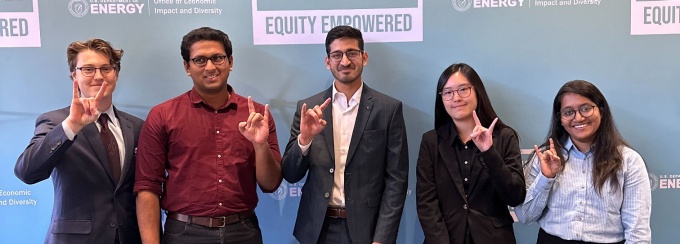YOUR COLLEAGUES
UB Team Participates in U.S. Department of Energy’s Justice Week to Help Efforts Towards Climate Resilience

Students L to R: Ethan Zemanick, Sourav Sankpal, Anesh Muthiah, Jennifer Tsang and Keerthy Priya Vanam.
BY: JACKIE HAUSLER
As climate change continues to pose risks and vulnerabilities to humankind, an interdisciplinary team of UB students and faculty are developing solutions to improving access to electrical power.
The student innovators were invited to join others from elite universities across the country – like Tufts, UC Berkeley and Columbia – to participate in The Opportunity Project (TOP), part of the U.S. Department of Energy’s (DOE) Justice Week 2023. The five-day "Equity Empowered." hybrid event ran Oct. 30 though Nov. 3 in Washington, D.C. and was dedicated to empowerment and moving towards a more equitable, clean and just energy future.
Susan Clark, assistant professor in the College of Arts and Sciences Department of Environment and Sustainability is recognized as an expert in the areas of vulnerability, climate change adaptation, sustainable development, community resilience and sustainability education. She was invited by the DOE to assemble a UB team for the event. Clark along with Michael Shelly, research assistant professor in Research and Education in Energy, Environment and Water (RENEW) mentored the team of students for this Department of Energy event.
“The data science and computer science students were chosen because of their strong technical skills and desire to use those skills to make a real societal impact,” says Clark.
According to the Department of Energy Office of Economic Impact, “TOP is an innovation program based at the U.S. Census Bureau that brings together universities, technologists, government and communities to create digital products that tackle public facing challenges using federal open data.” The Department of Energy’s goals include informing investments in grid resilience and restoration; delivering immediate benefits to existing emergency response systems during power outages; and providing visibility into disparities in access to energy.
While the tools and analyses created through the program could more immediately help communities recover from power outages and meet the needs of underserved communities, in the long run, the creations in this program could also lead the way for significant infrastructure investments. These improvements could not only to decrease the severity of power outages and modernize the grid, but also provide reliable and equitable electricity to all communities. The U.S. Department of Energy wants to ensure that “communities overburdened by power outages are not left behind as electrification advances towards an equitable, clean energy future.”
“We’re teaching our students that climate resilience is the ability to prepare for and respond to hazardous events – especially those related to climate change – and how they can use their talents to help,” says Clark. “The students are developing an app that will empower and enable communities, including local neighborhoods in Buffalo, to better help themselves prepare and communicate when a situation like last year’s blizzard happens. The app will allow two-way communication within the community, so people have more information and are empowered to help each other. It could also equip local emergency managers with information on where what needs are unmet while they are devising their plans on what action steps to take.”
The team presented an initial concept of their project on Nov. 1 at the Justice Week’s Hackathon: “The Opportunity Project: Improving Access to Electrical Power for Climate Resilience.”
“The hope is that these computer and data science students will provide a way to match those in need with people who can provide services, so people can be helped in real time as they are using it, and free up first responders to focus on the most urgent needs in the community,” she adds.
The undergraduate and graduate team of students include Anesh Muthiah, MS Engineering Science, Data Science; Sourav Sankpal, MS Engineering Science, Data Science; Keerthy Priya Vanam, MS Engineering Science, Data Science; Ethan Zemanick, BS Computer Science; and Jennifer Tsang, MS Computer Science and Engineering.
After Justice Week is complete, the team will continue working on the project at UB through the end of the semester with a culminating virtual presentation in January. In addition to Clark and Shelly, support staff for the team includes Caitlin Hoekstra, director of Career Development and Experiential Learning in the School of Engineering and Applied Sciences as well as Andrew Lavoie, design challenge coordinator in the Startup and Innovation Collaboratory.
For more information about TOP and Justice Week, visit energy.gov.